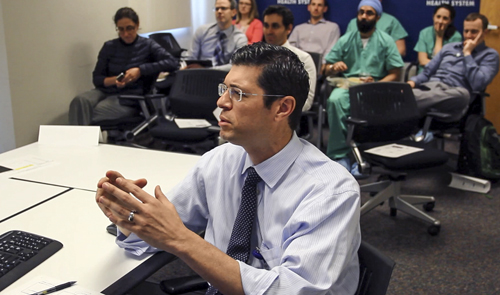UC Davis ECHO® Pain Management TeleMentoring
Videoconference peer-to-peer mentoring program
UC Davis ECHO® Pain Management is a peer-to-peer video conference mentoring program designed to support community-based primary care clinicians in their mission to provide high quality, safe and effective pain care. Through weekly videoconference learning and support sessions, the program provides primary care providers with the opportunity to increase their specialized knowledge in pain management.
Providers at participating clinics and health centers convene once a week for 10 months for a one-hour video conference that features didactic presentations on essential pain care topics combined with in-depth case discussions. Each interactive educational session empowers primary care providers with the tools to safely identify and understand pain and deliver safe, compassionate and effective care. All clinical staff members are encouraged to participate.
Program highlights
 David Copenhaver, a UC Davis anesthesiologist and pain medicine specialist, as well as director of the UC Davis ECHO® Pain Management Telementoring Program, facilitates a video conference session with community health clinics throughout California.
David Copenhaver, a UC Davis anesthesiologist and pain medicine specialist, as well as director of the UC Davis ECHO® Pain Management Telementoring Program, facilitates a video conference session with community health clinics throughout California.
- Expert, evidence-based guidance and support from leaders in pain medicine, psychiatry, physical therapy and more
- American Medical Association (AMA) Continuing Medical Education (CME) credits for physicians and continuing education (CE) credits for nurses, physician assistants, psychologists, dietitians and sonographer or vascular technicians
- Interactive and in-depth case reviews with real-time feedback from pain medicine faculty
- One-on-one telephone mentoring with pain medicine faculty to answer questions
- Exclusive access to presentations, recorded video sessions and other educational resources
Sample curriculum topics
- Motivational interviewing techniques and cognitive reframing
- Physical exams for pain
- Nutrition and pain management
- Rational polypharmacy technique
- Analgesic pharmacology nonsteroidal anti-inflammatory drugs (NSAIDs)
- Opioid risk stratification
- Naloxone as a rescue for unintentional overdose
- Opioid tapering methodologies
- Buprenorphone as a strategy for pain management
- Addiction and chronic pain
- Adherence monitoring
- Marijuana, cannabinoids and pain management
- Failed back surgery syndrome
- Pain procedures for chronic pain
- Ultrasound-guided procedures and pain care for primary care providers
- Regenerative medicine in the primary care setting
- Conducting a pain visit in 15 minutes
Comments from previous participants
- “I think the ECHO® program has made us a resource on pain management within our practice. We also work with a lot of mid-level staff, so we’re even more of a resource for them. I think the pain management within our clinic has improved a lot as a result.”
- “I have confidence in evaluating pain issues, knowledge when making referrals and the ability to make decisions on client care which has the best outcome.”
- “I thought the most useful aspect of the curriculum was having each subject presented by a specialist in that field who was then available for questions and discussion.”
- “We have better tools and better plans for how to manage pain patients.”
- “I feel more equipped to handle pain patients; having additional tools learned through ECHO® decreases my anxiety about caring for pain patients.”


